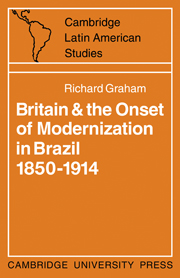Book contents
- Frontmatter
- Contents
- Preface
- Abbreviations used in the footnotes
- A note on spelling
- Brazil: physical features and state capitals
- Introduction: Contrasting Societies: Britain and Brazil
- 1 The Onset of Modernization in Brazil
- 2 Coffee and Rails
- 3 The Export–Import Complex
- 4 The Urban Style
- 5 Britain and the Industrialization of Brazil
- 6 Changing Patterns of Labor: Slave Trade and Slavery
- 7 Britain and the Entrepreneurs
- 8 Freedom and Association
- 9 Progress and Spencer
- 10 Middle-Class Britain and the Brazilian Liberals
- 11 Individual Salvation
- 12 Declining Influence
- Conclusion
- Appendix A Financial Record of the Minas and Rio Railway Company, Ltd, 1881–1902
- Appendix B Financial Record of the São Paulo Railway Company, Ltd, 1865–1920
- Appendix C Exports from Great Britain to Brazil, 1850–1909
- List of Sources
- Index
12 - Declining Influence
Published online by Cambridge University Press: 12 October 2009
- Frontmatter
- Contents
- Preface
- Abbreviations used in the footnotes
- A note on spelling
- Brazil: physical features and state capitals
- Introduction: Contrasting Societies: Britain and Brazil
- 1 The Onset of Modernization in Brazil
- 2 Coffee and Rails
- 3 The Export–Import Complex
- 4 The Urban Style
- 5 Britain and the Industrialization of Brazil
- 6 Changing Patterns of Labor: Slave Trade and Slavery
- 7 Britain and the Entrepreneurs
- 8 Freedom and Association
- 9 Progress and Spencer
- 10 Middle-Class Britain and the Brazilian Liberals
- 11 Individual Salvation
- 12 Declining Influence
- Conclusion
- Appendix A Financial Record of the Minas and Rio Railway Company, Ltd, 1881–1902
- Appendix B Financial Record of the São Paulo Railway Company, Ltd, 1865–1920
- Appendix C Exports from Great Britain to Brazil, 1850–1909
- List of Sources
- Index
Summary
The First World War marked the end of British predominance in Brazil. Even in the years before 1914 the importance of Great Britain was beginning to pale in relation to the total Brazilian scene, first, and most importantly, because of the development of Brazil itself, and, secondly, because of the increasing competition offered by other nations. The monopoly of foreign economic power once held by the British was eroding away and the war speeded the process to its conclusion.
Brazil, because of all the changes since 1850, had been set loose in the rapids of the modernizing process and, although the country might temporarily linger in some peaceful cove or be occasionally snagged by the roots of resistance, it could not return to the starting point. Rather, the persistent pull of the current impelled it ever onward. The corporate society still hung on, not only in some parts of the country and in the beliefs of some persons, but also in some of the attitudes of most individuals; nevertheless, continual modernization was now merely a matter of expanding the geographical areas of influence, increasing the size of the groups that had already been affected, and extending within each individual the logical implications of the attitudes he had accepted or positions into which he had been placed. By 1914 Brazil had begun; the first phase of the process was over.
Most important were the changes in values, ideas, and worldviews. The goal of an industrialized society had been adopted by a well-defined sector of the population.
- Type
- Chapter
- Information
- Britain and the Onset of Modernization in Brazil 1850–1914 , pp. 298 - 318Publisher: Cambridge University PressPrint publication year: 1968



